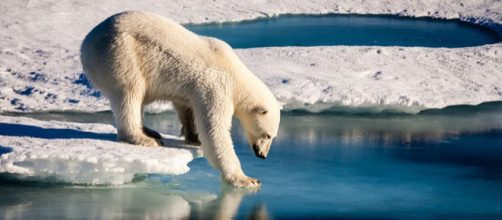The survival of Polar Bears in the Arctic is under threat because ice shelves are melting due to Global warming and the giant animals are finding it difficult to hunt for food. A photographer has captured on video the plight of one of these animals on Baffin Island as it is scrounging for food in places where there is no sign of any ice.
New Zealand Herald reports that the loss of ice due to climate change has a direct effect on the survival chances of these animals. They usually use the ice shelves as platforms to hunt for their food that consists of other marine creatures like ringed and bearded seals.
However, Baffin Island is one region in the Arctic that has succumbed to the evils of global warming endangering the lives of these animals.
Global warming is to blame
According to available data, the Barnes Ice Cap on Baffin Island is at present approximately 1,600 feet thick. It is melting at a fast pace due to global warming which is attributed to the increase in the volume of greenhouse gases in the atmosphere and the consequent rise in the surrounding temperatures in the Arctic.
This sort of environment is posing survival problems for the polar bears that have entered the red data list of threatened and endangered species identified by the International Union for Conservation of Nature (IUCN).
Obviously, the threat of their extinction is genuine, and their population could reduce drastically within a time span of 40 years. Critics of climate change should note that global warming is melting the ice shelves which, in turn, is affecting the food cycle of polar bears and their survival.
The polar bears must be saved
The problem is intrinsically woven into global warming which melts the Arctic ice and disturbs the ecological balance.
This affects not only the polar bears but all forms of marine life, and the roots can be traced to greenhouse gases that heat up the atmosphere, causing the glaciers to melt. Scientists have expressed fears that this could lead to rising sea levels and flooding of cities near the coastal regions.
The health of our planet is a matter of concern, and the Paris climate accord was drawn up in 2015 to jointly fight the evils of climate change.
World leaders have realized that there is a need to stop using fossil fuels which contribute to the rise in temperatures and embrace alternative energies like electricity. Some counties have already taken action to make electric cars the standard and have indicated dates by which fossil fuels should be banned.
These are positive steps to repair the environment but it will be a run against time to save species of wildlife like the Arctic polar bears.


